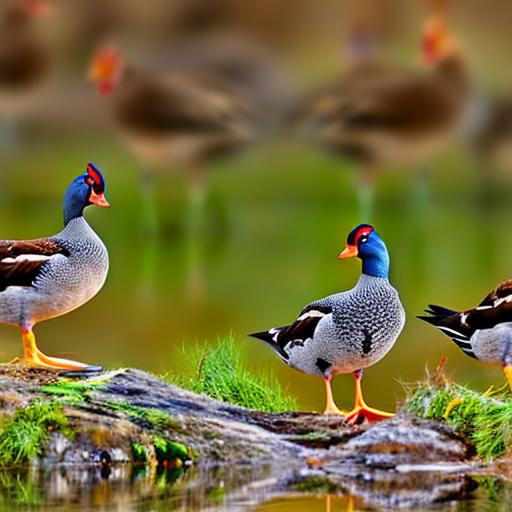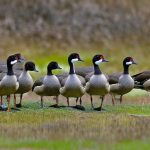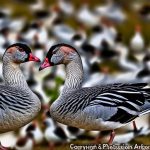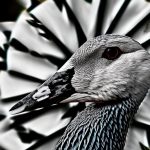Keeping chickens, ducks, and geese together can be a rewarding and enjoyable experience for poultry enthusiasts. Each of these birds brings its own unique characteristics and benefits to the flock. Chickens are known for their egg-laying abilities and pest control, while ducks are excellent foragers and provide rich, flavorful eggs. Geese are great for protecting the flock and can also serve as effective weed control. When kept together, these birds can create a harmonious and balanced ecosystem, each contributing to the overall health and well-being of the flock. However, it’s important to understand the compatibility of these birds, create a suitable habitat, provide proper nutrition, manage their health, and understand their behavior and social dynamics in order to successfully keep chickens, ducks, and geese together.
Key Takeaways
- Keeping chickens, ducks, and geese together can be a rewarding and sustainable practice for small-scale farmers and homesteaders.
- Understanding the compatibility of chickens, ducks, and geese is crucial for successful cohabitation, as each species has different needs and behaviors.
- Creating a suitable habitat for chickens, ducks, and geese involves providing adequate space, shelter, and access to water for each species.
- Feeding and nutrition for chickens, ducks, and geese should be tailored to their specific dietary requirements and supplemented with appropriate foraging opportunities.
- Managing health and veterinary care for chickens, ducks, and geese requires regular monitoring, preventative measures, and prompt treatment of any illnesses or injuries.
Understanding the Compatibility of Chickens, Ducks, and Geese
Before keeping chickens, ducks, and geese together, it’s important to understand their compatibility and potential challenges. Chickens are generally more territorial and can be aggressive towards ducks and geese, especially during feeding time or when establishing a pecking order. Ducks are more adaptable and can get along with both chickens and geese, but they may engage in rough mating behavior that can be harmful to chickens. Geese are known for their protective nature and may become aggressive towards other birds if they feel threatened or if they are nesting. To ensure compatibility, it’s important to introduce all three species at a young age so they can establish a pecking order and social hierarchy. Providing enough space, food, and water sources can also help minimize competition and aggression among the birds. Additionally, providing hiding spots and separate nesting areas can help reduce stress and conflict within the flock.
Creating a Suitable Habitat for Chickens, Ducks, and Geese
Creating a suitable habitat for chickens, ducks, and geese is essential for their health and well-being. The coop should be spacious enough to accommodate all three species comfortably, with separate nesting areas for each type of bird. The coop should also provide protection from predators and the elements, with adequate ventilation and natural light. Outdoor space is equally important, as chickens, ducks, and geese all require access to fresh air, sunlight, and opportunities for foraging. Fencing is essential to keep the birds safe from predators and to prevent them from wandering off. It’s important to provide access to water sources such as ponds or shallow pools for ducks and geese to swim and forage in. Additionally, providing natural vegetation, hiding spots, and enrichment activities can help create a stimulating environment for the birds to explore and thrive in.
Feeding and Nutrition for Chickens, Ducks, and Geese
Feeding and nutrition are crucial aspects of keeping chickens, ducks, and geese together. While all three species have similar dietary requirements, there are some differences that need to be taken into consideration. A balanced diet for chickens, ducks, and geese should consist of high-quality poultry feed that is appropriate for their age and stage of development. Additionally, ducks and geese require access to water for drinking and foraging, as they have a more aquatic nature compared to chickens. Providing access to natural vegetation, insects, and small fish can help supplement their diet and provide essential nutrients. It’s important to monitor the feeding habits of each species to ensure that all birds are getting enough food without being outcompeted by others. Providing separate feeding areas or using feeders that accommodate multiple birds at once can help minimize competition and ensure that all birds have access to the nutrition they need.
Managing Health and Veterinary Care for Chickens, Ducks, and Geese
Managing the health and veterinary care of chickens, ducks, and geese is essential for maintaining a thriving flock. Regular health checks should be conducted to monitor the overall well-being of the birds and to identify any signs of illness or injury. Providing a clean and hygienic environment is crucial for preventing the spread of diseases among the flock. Vaccinations should be administered as recommended by a poultry veterinarian to protect against common diseases such as avian influenza or Newcastle disease. Additionally, it’s important to provide regular parasite control measures such as deworming and mite prevention to keep the birds healthy and comfortable. In the event of illness or injury, it’s important to seek veterinary care promptly to ensure the best possible outcome for the affected bird. By staying proactive about health management and seeking professional veterinary care when needed, poultry enthusiasts can help ensure the long-term health and well-being of their chickens, ducks, and geese.
Behavior and Social Dynamics of Chickens, Ducks, and Geese
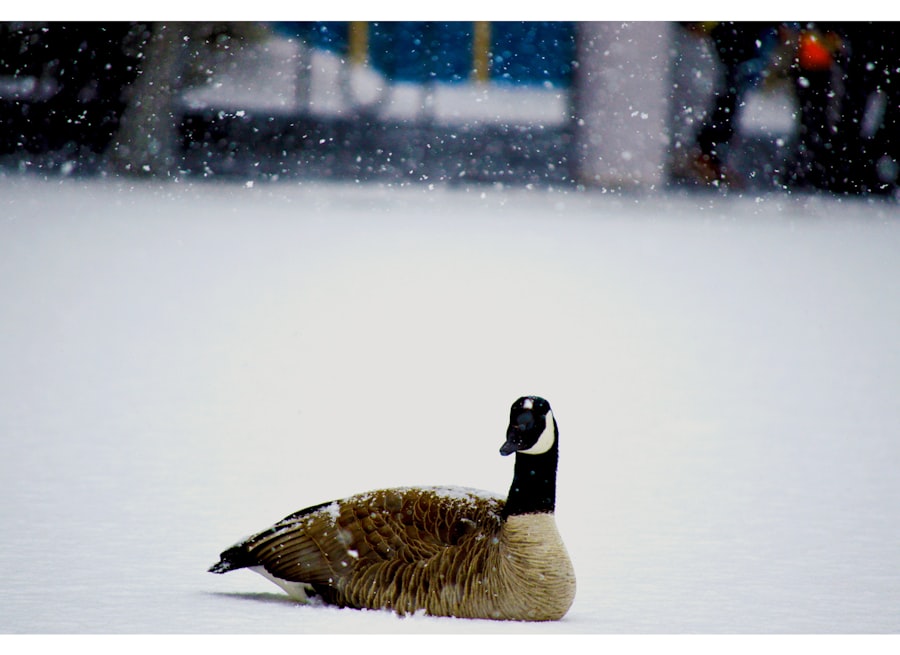
Understanding the behavior and social dynamics of chickens, ducks, and geese is essential for maintaining a harmonious flock. Chickens have a complex social structure with established pecking orders that can lead to aggression or bullying within the flock. Ducks are generally more social and form strong bonds with their flock mates, but they can also engage in rough mating behavior that may be harmful to other birds. Geese are known for their protective nature and may become aggressive towards other birds if they feel threatened or if they are nesting. To promote positive social dynamics within the flock, it’s important to provide enough space, food, water sources, and hiding spots to minimize competition and aggression among the birds. Additionally, providing enrichment activities such as perches or toys can help reduce stress and boredom within the flock. By understanding the behavior and social dynamics of chickens, ducks, and geese, poultry enthusiasts can create a supportive environment that allows all three species to coexist peacefully.
Tips for Successfully Keeping Chickens, Ducks, and Geese Together
Successfully keeping chickens, ducks, and geese together requires careful planning and consideration of their compatibility, habitat needs, nutrition requirements, health management, and social dynamics. To ensure a harmonious flock, it’s important to introduce all three species at a young age so they can establish a pecking order and social hierarchy. Providing enough space, food, water sources, hiding spots, and separate nesting areas can help minimize competition and aggression among the birds. Creating a suitable habitat with access to outdoor space, natural vegetation, water sources, and enrichment activities is essential for their physical and mental well-being. Monitoring their feeding habits and providing a balanced diet that meets their nutritional needs is crucial for their overall health. Regular health checks, vaccinations, parasite control measures, and prompt veterinary care are essential for managing their health effectively. Understanding their behavior and social dynamics can help create a supportive environment that allows all three species to coexist peacefully within the flock. By following these tips and staying proactive about their care, poultry enthusiasts can enjoy the many benefits of keeping chickens, ducks, and geese together in a thriving and harmonious flock.
If you’re considering keeping chickens, ducks, and geese together, it’s important to plan a suitable coop and run that can accommodate all three species. To ensure the well-being of your feathered friends, it’s crucial to provide adequate space and facilities for each type of bird. For helpful tips on designing a coop and run that meets the needs of chickens, ducks, and geese, check out this informative article on PoultryWizard. This resource offers valuable insights into creating a harmonious living environment for multiple poultry species.
FAQs
Can I keep chickens, ducks, and geese together?
Yes, it is possible to keep chickens, ducks, and geese together in the same coop or living space. However, there are some considerations to keep in mind to ensure the well-being of all the birds.
What are the considerations for keeping chickens, ducks, and geese together?
It is important to provide enough space for all the birds to move around comfortably. Additionally, each species has different dietary and environmental needs, so it is important to provide appropriate food, water, and shelter for each type of bird.
What are the benefits of keeping chickens, ducks, and geese together?
Keeping chickens, ducks, and geese together can provide a diverse and dynamic flock, with each species contributing different behaviors and characteristics. Additionally, they can help keep pests under control and provide natural fertilization for the garden.
Are there any potential challenges of keeping chickens, ducks, and geese together?
One potential challenge is that ducks and geese may create a mess with their water activities, which can be a concern for the cleanliness of the coop. Additionally, different species may have different social dynamics, so it is important to monitor the flock for any signs of aggression or bullying.
What are some tips for successfully keeping chickens, ducks, and geese together?
Providing ample space, appropriate food and water, and monitoring the flock for any signs of stress or aggression are important tips for successfully keeping chickens, ducks, and geese together. Additionally, providing separate nesting areas for each species can help minimize competition for nesting space.
Meet Walter, the feathered-friend fanatic of Florida! Nestled in the sunshine state, Walter struts through life with his feathered companions, clucking his way to happiness. With a coop that’s fancier than a five-star hotel, he’s the Don Juan of the chicken world. When he’s not teaching his hens to do the cha-cha, you’ll find him in a heated debate with his prized rooster, Sir Clucks-a-Lot. Walter’s poultry passion is no yolk; he’s the sunny-side-up guy you never knew you needed in your flock of friends!

